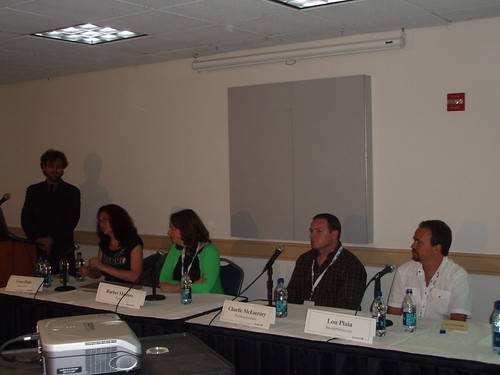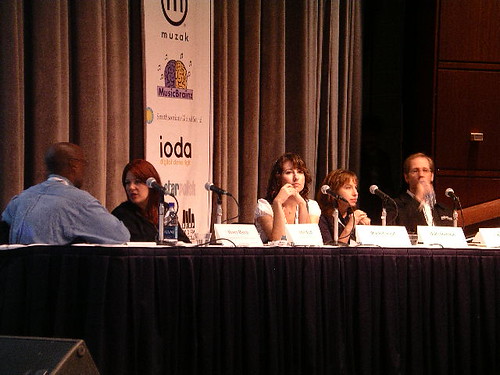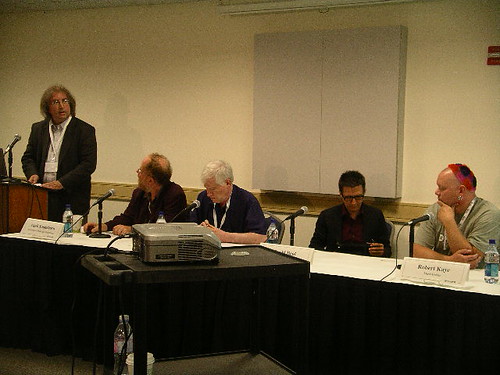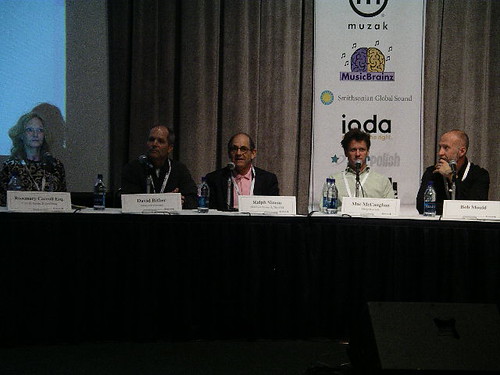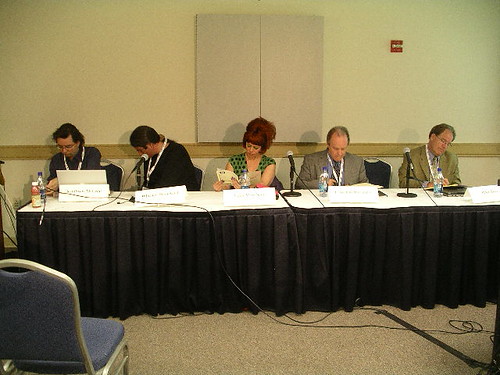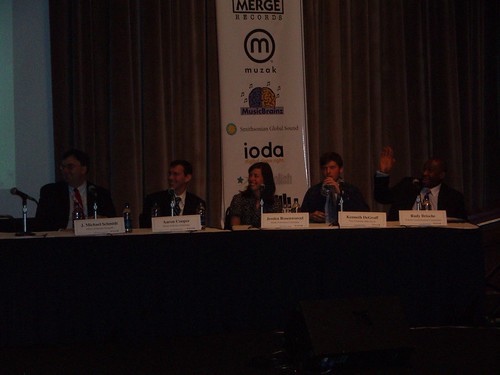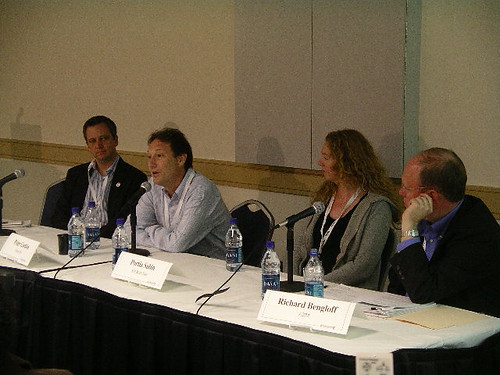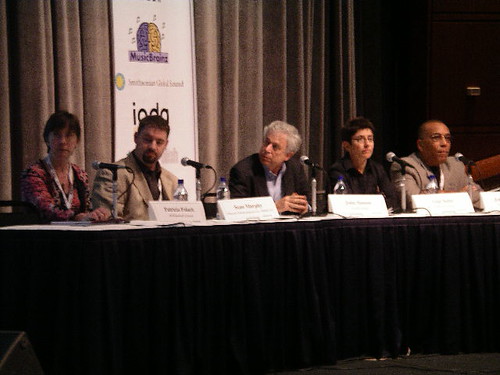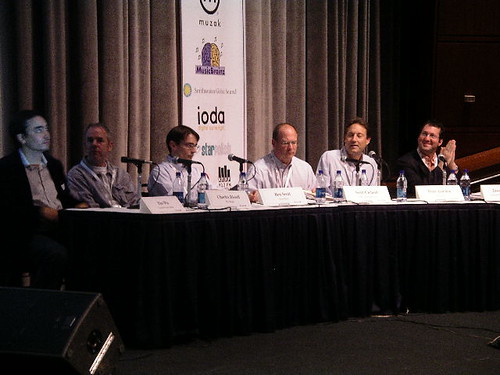Mike Dreese Co-Founder and CEO, Newbury Comics Inc.
Josh Madell Co-owner, Other Music
Franz Nicolay Musician, The Hold Steady, Anti-Social Music
Sean O'Connell President, Music Allies, Inc
Tim Quirk Vice President of Music Programming, Rhapsody
Michael Selverne Managing Partner, Selverne Mandelbaum & Mintz, LLP

10:07AM EST - TQ: What does the music store of the future look like?
JM: It's not going to look that much different. We focus on music that we love, and supporting bands that we love. Our music is based on our taste. We focus on mail-order, and hopefully our new downloads store will continue to improve, but for us its just about finding get new music and getting it into as many hands as possible. We have a strong brand name and people come to us because of our selection. We are selling less CDs for sure than we did five years ago, but we still have excited music fans coming in every day.
SO: I think the music store of 2020 will really be a curator, a trusted brand and a forward-thinker. If you're not on the web, you need to start being honest with yourself as a retailer about the future of the physical medium.
MD: I don't think there will be a music store in 2020. I think we have five to seven years left for the CD. Maybe niche music specialty stores will be around, selling collectibles, but the music store won't exist. Realistically, four to five years from now you'll see the end of the record store as we know it, besides a hundred or so examples of people clinging on. That model is running out of gas pretty quick.
10:17AM EST - TQ: As a musician, does this matter to you? Do sales even matter to your band?
FN: We've never expected to see money from retail sales, besides sitting at the merch table and getting hard cash in hand. It's nice to do in-stores and have another way to access your fans, but the royalty checks are pretty limited in the grand scheme of things.
TQ: In recognition of this fact, you all are getting online in various ways. Can you talk about this?
JM: We've been online for almost seven years with our mail-order service, because we have a lot of music that's hard to find. We just launched our download store, which is built around our weekly new releases email list. We write short record reviews and have about 25,000 people on the list. We have an independent mp3 download store, which is very curated, catering to the real music collector.
MD: We're acquiring a lot of legacy work and building a lot of exclusive collectibles, as far as movie merchandising and comics. We've got a pint glass series of notable artists, Marilyn Manson, Elvis Presley. Building merch is a very strong aspiration. We're in a good position for first arrival of such products, as we are helping creators decide what to make.
FN: As a band, a very small business, we can't handle merchandising ourselves. Though it might be profitable, we let our label, or services like MerchDirect.
10:26AM EST - TQ: Let's talk about other entities like Starbucks getting into music.
SO: I don't think that Starbucks is competitive at all. There are so few titles.
MD: It's certainly true that that which doesn't kill you makes you stronger. The best thing that happened to Newbury was when Tower Records came to Back Bay, MA. Starbucks really knows their customers. We're going to learn a lot from them, and their branding.
FN: I don't have a preference for my CDs being sold in a coffee shop or a record store.
TQ: What do exclusives mean for you?
JM: Exclusives are huge, especially with the glut of material out there these days. Customers are more knowledgeable about music than ever. Even just one bonus track, in the download world there is a lot of competition for those. If you can have a release a week or two early, or a couple exclusive live tracks, customers are really aware of that. If you have those, it can really drive business. We had the new Beirut record a month before it came out, because the label realized that people were going to get it for free if it wasn't readily available.
SO: We've had artists cut a couple of live songs just to stop the bleeding, to provide that exclusive material and ensure an album sale. We don't traditionally do retail marketing, but its become much bigger with these smaller labels.
MD: If we can get exclusives, we like them. But I think a lot of these are a classic record label bait-and-switch, repackaging the same product and selling it twice. The industry is reaping the harvest of exactly what it sowed when it started giving marketing rebates to big box music stores. The pricing environment that Wal-Mart and Target have created significantly diminishes the retailer's ability to set price.
10:38AM EST - FN: Exclusives are a troublesome topic from a musician's point of view. We're not a factory pushing out widgets. The label asks for two covers and six acoustic version so we can have an eMusic exclusive, and an iTunes exclusive, and something for Australia, and it upsets people because they have to keep buying the record. It's trying to make up for declining sales by scavenging the true fans, and it leads to a mindset on our part of: "how important are these songs?"
MD: Artists can't really control their image or their sound the way they used to.
SO: A huge part of an artist's profit now has to be catering to their unique fans, the people who want the bootlegs, the people who are visiting your site. A lot of the value of the music itself is filtering away.
10:48AM EST - MD: Songs are worth a lot, not perhaps through a typical record deal, but you've got to find another way to monetize the songs. My friend just got a song on Guitar Hero, and that's the biggest check he gets.
JM: There's a big opportunity today for smaller bands. The real small indie bands that were never able to make any money...they have an opportunity today.
11:00AM EST - Questions from the audience
Q: What do you think about labels packaging music with extra content like Rringles and web content?
FN: I think it's fighting a lost battle.
MD: These are without a doubt going to fail the first time around, but they're beginning to learn what it means to create account status out of a fan.

